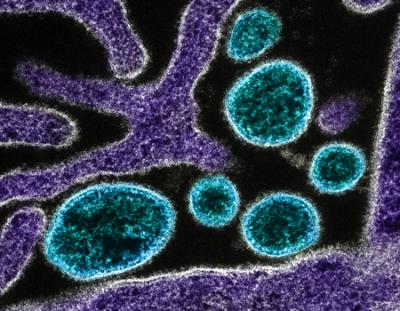
Nipah virus particles
Pathogen Biology, Pathogenesis, and Host Immunity
Developing products that can protect against pathogens of concern is an integrated process that requires basic and applied research. Fundamental knowledge of pathogen biology; structural properties; mechanisms of transmission, including identification of viral vectors; viral lifecycle; viral entry mechanisms and host receptors; tissue tropism; and host immune responses is critical to efforts informing the development of MCMs against new, emerging, or remerging pathogens.
Structure-Function Studies
Understanding the function of essential viral proteins will be necessary to enable structure-guided vaccine design, identify viral targets for the development of effective therapeutic candidates, and develop diagnostic and immunological assays. To facilitate this critical area of research, NIAID will support technologies including x-ray crystallography, nuclear magnetic resonance imaging, cryogenic electron microscopy, and high-throughput technologies, including computational modeling to characterize viral structural components.
Animal Models
Developing animal models that recapitulate human disease is a vital step toward understanding disease pathogenesis and mechanisms of immune protection as well as the assessment of MCM efficacy. Small animal models will be prioritized to enable rapid, scalable studies particularly valuable for screening countermeasure candidates for immunogenicity, drug candidate pharmacokinetics/pharmacodynamics, vaccine and therapeutic efficacy and safety. In parallel, development and characterization of large animal models, including non-human primates that closely recapitulate human disease, is pivotal to advance promising candidates toward clinical evaluation. NIAID will support the development of essential small and large animal models to better understand viral biology and to assist in vaccine and therapeutic development. NIAID also will ensure that well characterized animal models that recapitulate human disease are made available to the scientific community for evaluating priority MCMs.
Immunology and Assay Development
NIAID will support the design and development of serological assays that can serve as useful tools to evaluate MCMs, including evaluating the immunogenicity of promising vaccines and effectiveness of therapeutic candidates. These assays can also identify correlates of protection, identify antigen-specific responses to pathogens, and characterize cross-reactive responses to pathogens.
The design and development of approaches and research tools to assess and enhance cellular and tissue-specific immunity to specific pathogens and pathogen families will also be supported.
NIAID will provide for the expansion of specialized technologies related to high-throughput cell sorting/cytometry, immunologic assays, and sequencing, and expand support of genetic examination of zoonotic reservoirs that might contribute to emerging infectious diseases of global health importance.
Reagents and Resources
NIAID will support and coordinate the development and sharing of reagents and resources to accelerate fundamental research and the development of vaccines, therapeutics, immunological assays, and diagnostics. Reagent and resource development will include well characterized viral stocks, convalescent serum, and PBMCs to develop assays, protein or nucleic acid standards, mAbs, and animal models. The reagents will be put in NIAID-supported repositories and made available to the scientific research community.

